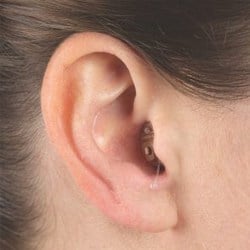Time to read: 8 minutes
Your hearing is one of your most important senses. So it makes sense to look after it!
We look at nine things you can do to improve your hearing.
1. Wear your hearing aids
 Your hearing isn’t the only part of your body that benefits when you wear your hearing aids:
Your hearing isn’t the only part of your body that benefits when you wear your hearing aids:
Overall general health improves, too. Research indicates people who wear hearing aids experience added health benefits. The effort you’re expending trying to hear your grandchild tell you a story when you aren’t wearing hearing aids could be the energy you spend taking her to the park when you do.
Mental health can suffer if you don’t treat hearing loss, especially if you’ve been isolating yourself from social gatherings because you can’t hear well. There's a strong correlation between hearing loss and depression among adults in the United States. Other study results indicate relationships between untreated hearing loss and increased anger, anxiety, social isolation and even dementia.
2. Take a walk
Exercise is one of the most beneficial things you can do for your overall health. Is it any surprise it’s good for your hearing health, too?
Hearing health professionals believe exercise increases the blood flow to the ear. Good blood flow is essential to the health of the tiny hair cells in the inner ear which are responsible for translating the sound your ears collect into electrical impulses for your brain to translate. These hair cells do not regenerate, so our hearing suffers permanently when they die or are damaged.
3. Stop smoking
Did you know that smoking can affect your hearing? Among all the other great reasons to give up smoking, we have another one for you.
Researchers in Japan discovered that people who smoked were 60 percent more likely to develop high-frequency hearing loss compared to non-smokers.
Even more alarmingly, nonsmoking participants who lived with a smoker were more likely to have a hearing loss than those who were not exposed to a household member who smoked
 4. Turn down the volume
4. Turn down the volume
Noise-induced-hearing loss (NIHL) is the permanent deterioration of hearing levels due to exposure to loud noise.
It most commonly occurs in both ears, but could be worse in a single ear, where one ear is exposed to more noise than the other e.g rifle use or commercial driving with the window open.
It is actually not as simple as giving you a list of sounds to avoid and then you are good to go.
Different factors have an influence on your risk for getting NIHL. The intensity level and the duration of the exposure goes hand in hand. The louder the sound the less time you can safely listen to it. It is generally accepted that sound levels of lower than 85dB are safe for human ears regardless of the duration of exposure.
5. Schedule a hearing evaluation
The best way to ensure maximised hearing is to have a regular hearing test as part of your health care routine. Since just about every man over the age of 60 has some degree of hearing loss, it is important to get a hearing evaluation to benchmark your hearing loss.
The sooner you identify and address your hearing loss, the sooner you can maximise your very best hearing.
Value Hearing has a comprehensive hearing assessment that includes the all important speech-in-noise testing.
Our hearing assessments are completely free of charge. So make your appointment today.
6. Pass the vitamins
Several vitamins and minerals have been linked to an improvement in ear function and hearing.
Folic acid promotes circulation to your ears, as well as energy production in the cells responsible for hearing.
Magnesium aids healthy nerve function in the auditory system and helps prevent damage to the inner lining of your arteries.
Zinc protects the hair cells within your ear, which are responsible for emitting the vibrations that send electrical signals to your brain. Zinc also supports your body's immune system, helping prevent ear infections.
B vitamins offer a host of potential benefits for your ears, including regulation of fluid levels and optimisation of oxygen use.
 7. Solve puzzles to combat your hearing loss
7. Solve puzzles to combat your hearing loss
The brain plays such a major role in processing the sound information our ear receives that we can’t ignore it. Research has shown that there are links between hearing loss and mental conditions such as anxiety and depression.
This could be a result of brain atrophy, which is when brain cells and connections shrink or are damaged. Like muscles, your brain needs a good workout to stay strong and continue pumping.
Solving a variety of puzzles like crossword puzzles, word searches, and Sudoku throughout the day or the week are fun exercises to get your brain juices flowing and prevent brain atrophy. Playing bingo and card games, such as hearts and poker, are also great ways to work your brain with your friends in a social setting.
8. Meditate to improve your hearing
Meditation and mindfulness exercises are increasing in popularity. They have been used to help reduce stress and anxiety, but did you know it could help improve your hearing?
Just like solving puzzles and putting into practice your listening skills in order to hone your hearing.
Several studies have suggested that practicing regular meditation can result in an increase ability to better process auditory stimuli including speech perception.
9.  Practice focusing on and locating sounds to sharpen your hearing
Practice focusing on and locating sounds to sharpen your hearing
One great activity is to go to your local park, sit down on the park bench and close your eyes. Concentrate on one type of sound - the sound of a bird in the trees, a dog barking, the rustling of the leaves, the sound of children playing on the swings, the tick-tick-tick of the wheels of a bicycle as it goes by. That will help you to isolate sounds and correctly identify them.
It will also help you learn to filter out general background noises that you can now hear, but don’t need to pay close attention to.
Practice having conversations both one-on-one and in small groups. Having new hearing aids is a great opportunity to more deeply connect with friends and loved ones again through conversation.
Turn down the TV volume to what other people in your household consider to be ‘normal’ levels and practice listening. Television news and talk shows are excellent to start with, as the volume and the cadence of speech tend to be consistent during the length of program. If you need to, consider using closed captioning and subtitles until your brain gets used to processing and interpreting the signals it’s receiving.
Another technique is to read aloud, to gauge a sense of a suitable speaking volume.
Some people find it useful to keep a daily diary of experiences with a new hearing aid. Jot down your notes and observations. Be as detailed as possible and then review the evening before your first follow up visit with your audiologist to see if those early observations still hold true.
You might find that sounds you found difficult to process, like annoying background noise, or your voice sounding too loud, is less of an issue after several weeks of working with your hearing aids.
Bring your notes with you to share with your audiologist for that first post-fitting appointment as adjustments to the devices can be made at your visit.